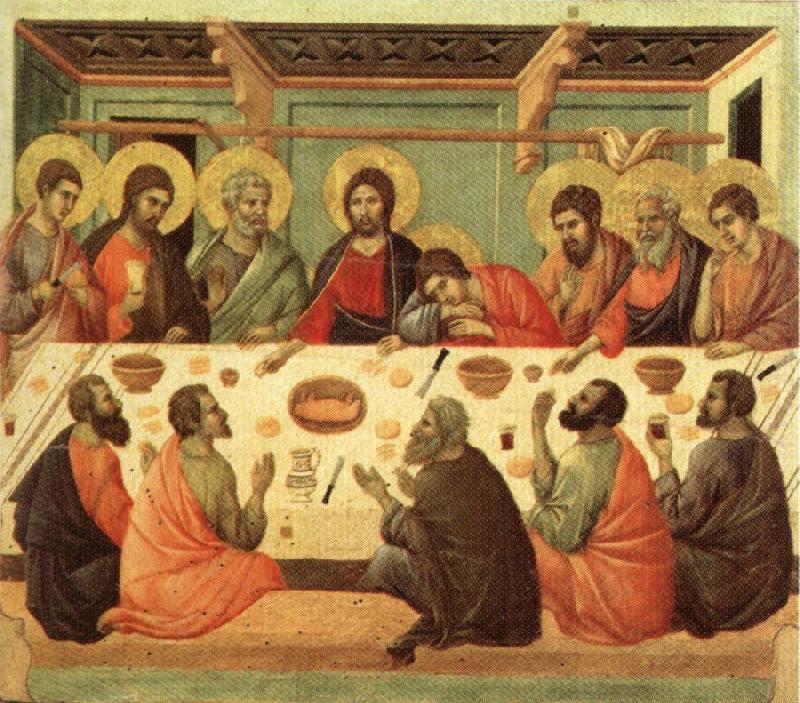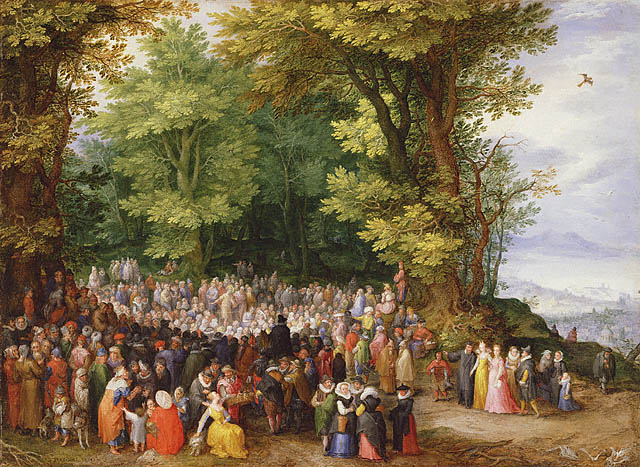An icon never attempts to do what a camera would have done, if cameras had existed centuries ago. The forms and colors used by the painter point to the underneath of the scene. The Temple and the Jerusalem buildings in the background seem to have a wrong perspective. That's because this is a trans-historical event - beyond or outside of picturable earth-time.
Joseph holds the little doves; his gift of the poor. Mary is already experiencing this first moment of separation. The holy people of great age, Simeon and Anna, represent ancient Israel awaiting the Messiah. Mary doesn't wear a maphorion of heavenly blue, but a dark red-brown - like the earth. She is one of us, and one with us in all the struggles that come with living on this earth. There is a great veil spread from left to right over the top of the scene: God is covering us with his love in the self-offering of Christ.
The Gospel account of the Presentaton of Jesus in the Temple is found in Luke 2:22-40.
Our Father, Who art in heaven...
Mary submits to a ritual of religious purification in Jerusalem forty days after the birth of her child. Does this seem odd? Mary of all people! Maybe she is teaching me, that I must be willing to fulfill the things God asks of me? Do I? Or do I exempt and excuse myself?
Hail Mary, full of grace...
Purification? Tears, even weeping for the sins of my past. Or, and this is a problem for many people, holding onto the past and not allowing God to do with our mistakes, wrong turns and ignorance, what God wants to do with it all - which is to let it be lost in the forever abyss of God's mercy.
Hail Mary, full of grace...
This ritual of presentation, performed for first-born males, indicated that the child was God's particular property. A gift of young birds is made to buy the child back: the gift of the poor. God divests himself of his richness and becomes one with us in our human poverty.
Hail Mary, full of grace...
Old Simeon has spent his life as a kind of holy watchman, awaiting the Messiah's birth: Jesus, the Light of the Nations and Israel's consolation. But how does he know these things? Then and now God shares what I should know, what I must know. God always does his part.
Hail Mary, full of grace...
Simeon's song is an act of thanksgiving to God. He is filled with an over-the-top joy for having seen the Messiah and for all the heavenly blessings the child will bring to God's people. Imagine that Simeon then passes the baby to me as I stand in this scene, and I announce what this baby means to me. What do I sing about that people will remember until the end of time?
Hail Mary, full of grace...
And Mary and Joseph marveled at what was said about Jesus. They marveled means they expressed joy and wonder at what's being revealed in Christ - already! And God is always revealing, sharing or making himself known in Christ. Some people yawn, others doze, still others distract themselves. But I want to marvel!
Hail Mary, full of grace...
The temple to which the infant Jesus was brought was wondrously beautiful. Indeed, the golden roof reflecting the sun made it nearly impossible to look at. But this temple was torn down by the Romans in 70 A.D. Ah, my heart will take its place!
Hail Mary, full of grace...
The thoughts of many hearts will be laid bare. Exposing the thoughts of my heart? And the thoughts of my heart are these: a welcome for Jesus, friendship with Jesus, love for other people.
Hail Mary, full of grace...
The temple was a chaotic slaughterhouse with bloody animal sacrifices taking place round the clock. But all of this will end. Jesus came to the temple, even in his infancy, to give himself to God in love. It is a sacrificial gift that is for all and forever.
Hail Mary, full of grace...
Simeon said to Mary and Joseph that the Child will be contradicted. I stay close to Mary in this scene and trust God's forgiveness for any way in which I have ever contradicted her Son by my ignorance, foolishness, hatred or fear.
Hail Mary, full of grace...
Glory be to the Father...
 |
| Oxeye Daisy ~ Bethlehem Star ~
a reminder of the Magi's star.
|








.jpg)













.jpg)





